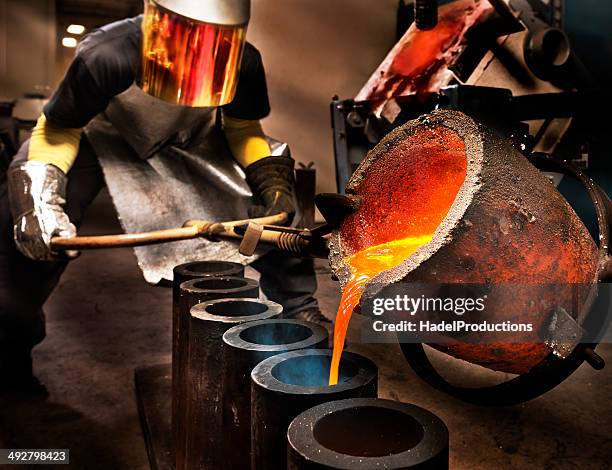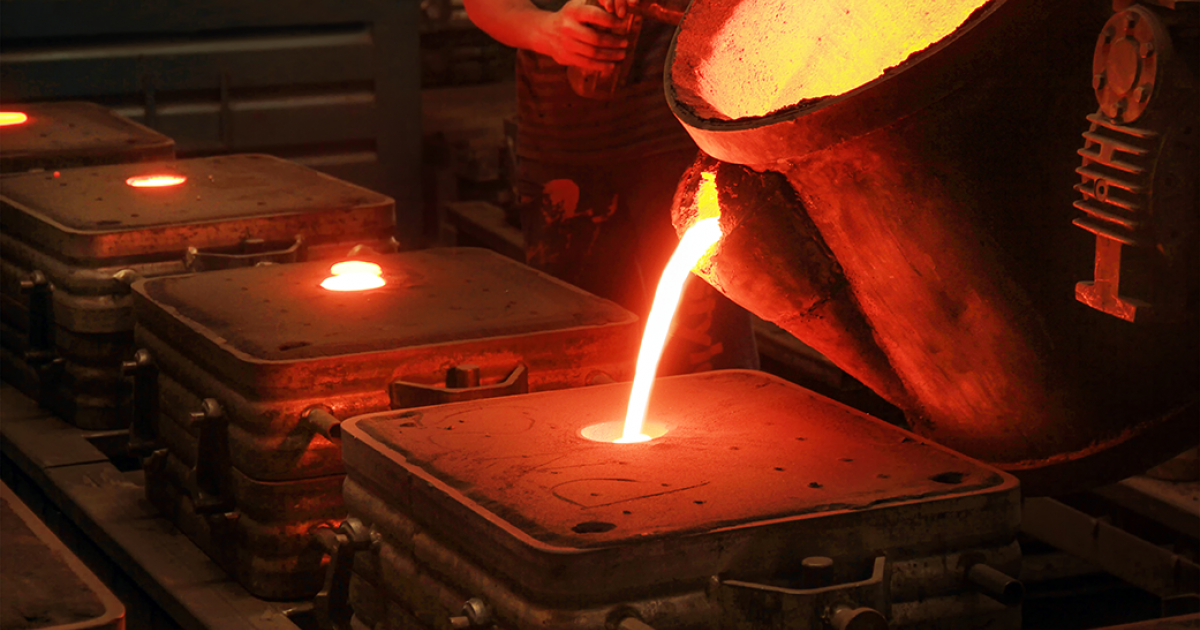Traditional Metal Casting Techniques That Still Define Modern Foundries
Wiki Article
A Comprehensive Guide to Metal Casting: Benefits and Services Used by Foundries
Metal casting is an important procedure in different markets, using various benefits through the services of foundries. These facilities change liquified metal right into specific and sturdy components, dealing with specific customer demands. By utilizing advanced modern technologies, shops guarantee high quality and performance in manufacturing. Nonetheless, the intricacies of metal casting and the varied techniques entailed raise essential inquiries concerning its role in contemporary production. What developments exist in advance in this necessary field?Understanding the Metal Casting Process
The metal casting process is a basic strategy made use of in producing to create complex shapes and parts. This technique entails pouring liquified metal right into a mold developed to develop the preferred object. The process begins with pattern development, which offers as a layout for the mold. Metal Casting. Different products, such as sand, metal, or ceramic, are used for mold-making, depending on the particular requirements of the casting
When the mold and mildew is prepared, molten metal is put right into it and allowed to strengthen and cool down. After solidification, the mold is eliminated, disclosing the actors component. Different strategies, including sand casting, investment casting, and die casting, are employed, each fit to different applications and materials. Quality control steps, such as evaluations and screening, are vital to assure the end product satisfies requirements. On the whole, the metal casting procedure plays an essential function in generating components for sectors ranging from automotive to aerospace.
Trick Benefits of Metal Casting
Metal casting offers significant advantages that make it a recommended manufacturing technique in different markets. Its layout flexibility and accuracy enable for elaborate shapes, while cost-efficient mass production boosts effectiveness. In addition, the adaptability and toughness of materials used in casting add to the sturdiness of the final products.Layout Adaptability and Precision
Launching amazing layout flexibility and precision, metal casting permits designers and designers to create intricate forms and functions that would certainly be difficult or challenging to attain with other producing approaches. This capability enables the manufacturing of intricate geometries, inner structures, and fine information that enhance item performance and appearances. In addition, different casting techniques, such as sand casting, investment casting, and pass away casting, provide more options for customization, accommodating diverse product residential properties and project demands. The flexibility of molds permits adjustments during the design stage, simplifying the change from idea to final item. Eventually, metal casting stands out for its capacity to deliver high-precision parts, making it an invaluable procedure in markets varying from auto to aerospace and beyond.Economical Automation
Economical mass production stands as one of the main benefits of metal casting, allowing makers to create big quantities of parts at a reduced price per unit. This performance arises from the capability to create intricate mold and mildews that can be recycled multiple times, significantly lowering configuration and operational costs. Additionally, metal casting procedures, such as sand casting and die casting, enable high throughput, making it possible to fulfill the demands of large-scale production runs. The lowered product waste and power usage additionally improve expense financial savings, making metal casting an appealing option for industries needing mass parts. Overall, the economical nature of metal casting settings it as a recommended method for suppliers intending for economic effectiveness in their production processes.Product Adaptability and Strength
Among the standout characteristics of metal casting is its exceptional material adaptability, which permits the usage of a wide variety of alloys and metals. This versatility makes it possible for producers to select materials that ideal suit their certain applications, from aluminum and bronze to iron and steel. Each metal provides special residential properties, consisting of varying levels of toughness, rust resistance, and thermal conductivity. Metal casting can generate components that fulfill stringent efficiency requirements across diverse markets, such as vehicle, aerospace, and construction. Additionally, the stamina of cast metals can be improved via numerous therapy procedures, ensuring toughness and longevity. Metal Foundry. In general, the combination of material flexibility and fundamental stamina makes metal casting a favored choice for creating premium elementsKinds of Metal Casting Methods
Metal casting includes a range of techniques that cater to different production demands and product homes. Typical methods include sand casting, which makes use of a sand mold and mildew for complicated shapes, and investment casting, known for its accuracy and surface area finish. Die casting is one more technique that employs high-pressure shot of molten metal into molds, suitable for automation of small components.Covering molding supplies a much faster alternative, using a resin-coated sand to produce thin-walled molds, while lost foam casting enables complex styles without the requirement for a core.
Additionally, continual casting is used for producing lengthy areas of metal, such as bars or sheets, by strengthening molten metal in a continuous procedure. Each technique is and offers distinct benefits chosen based on variables like the needed information, production quantity, and material kind, making sure superior results in metal fabrication throughout various markets.
The Role of Foundries in Metal Casting
Factories play a critical duty in the metal casting process, working as the facilities where molten metal is changed into completed items. These specialized establishments are outfitted with the required devices and technologies to manage numerous metals, making certain top notch outcomes. Shops are responsible for a blog number of essential functions, consisting of thawing the metal, pouring it into mold and mildews, and permitting it to solidify.Additionally, they preserve rigorous safety and environmental requirements to shield workers and reduce environmental influence. Competent professionals and engineers collaborate to enhance casting processes, boosting effectiveness and decreasing waste. Factories also involve in high quality control actions, guaranteeing that the final items meet certain tolerances and specs. This high quality guarantee is crucial for industries that rely upon specific elements, such as automotive and aerospace. As an outcome, factories add considerably to the general manufacturing landscape, making it possible for technology and growth throughout various sectors.
Custom-made Metal Casting Solutions
Customized metal casting services use customized layout remedies that satisfy particular customer requirements. These solutions also supply product option experience, making certain the best metal is selected for the preferred application. Such versatility and understanding enhance the total top quality and performance of the final product.
Customized Layout Solutions
Tailored design solutions in metal casting provide producers with the flexibility to create elements that meet particular efficiency and aesthetic needs. Factories use customized services that allow customers to define dimensions, shapes, and surface area finishes to achieve wanted results. This customization process frequently consists of cooperation in between developers and designers, making sure that the end products align with operational needs and market standards. Advanced technologies, such as computer-aided style (CAD) and simulation software application, allow exact modeling and testing of parts prior to production, reducing errors and boosting efficiency. By leveraging customized style options, organizations can optimize functionality while decreasing waste and costs, ultimately bring about a more competitive edge on the market. This versatility is vital for markets needing distinct applications and specs.Material Selection Experience
When picking products for metal casting, experience plays a crucial duty in making certain that the ideal option aligns with both performance needs and cost-effectiveness. Factories utilize experienced professionals that recognize the buildings of numerous metals and alloys, allowing them to advise suitable materials for specific applications. Variables such as stamina, corrosion resistance, and thermal conductivity are carefully taken into consideration to satisfy the client's requirements. Additionally, sector patterns and developments in product science inform these choices, enabling foundries to remain competitive. By leveraging their know-how, shops can aid customers in guiding with complicated product choices, eventually leading to boosted item high quality and reduced production prices. This specific expertise is important for attaining successful end results in customized metal casting solutions.Quality Assurance in Metal Casting
Quality assurance in metal casting is essential to assure that the end products fulfill the required requirements and performance requirements. Shops employ a range of strategies and approaches to assure the best quality of cast components. This process starts with stringent material assessments, validating that raw materials comply with market requirements. Throughout the casting procedure, real-time surveillance and testing are conducted to evaluate parameters such as temperature, mold stability, and dimensional accuracy.
Applications of Metal Castings Throughout Industries
Metal spreadings play a crucial function in various markets, working as the foundation for countless applications. In the vehicle sector, cast elements such as engine blocks and transmission real estates are required for lorry performance and reliability. The aerospace market relies upon precision spreadings for crucial parts that guarantee security and performance in flight. Furthermore, the building and construction industry utilizes metal castings for components, fittings, and hop over to these guys structural components, improving the more info here toughness of structures and infrastructure.The energy industry benefits from castings utilized in generator blades and various other equipment important for power generation. The medical area additionally makes use of metal castings in gadgets and instruments, demonstrating the adaptability of this production procedure. On the whole, metal spreadings are integral to the functionality and development of diverse industries, showcasing their relevance in modern-day innovation and framework growth
Regularly Asked Inquiries
What Products Are Generally Made Use Of in Metal Casting?
Usual products utilized in metal casting include aluminum, iron, bronze, brass, and steel. Each product provides distinct residential properties appropriate for different applications, allowing manufacturers to select the very best alternative based upon deterioration, toughness, and weight resistance.How much time Does the Metal Casting Refine Typically Take?
The metal casting process normally takes several hours to a couple of days, depending upon elements such as the intricacy of the design, kind of metal utilized, and the certain casting approach employed by the foundry.
What Is the Ecological Impact of Metal Casting?
The ecological effect of metal casting consists of energy intake, discharges, and waste generation. Shops commonly execute actions to mitigate these impacts, such as recycling products and utilizing cleaner innovations to reduce their environmental footprint.Can Metal Casting Be Done for Small-Scale Projects?
Metal casting can without a doubt be done for small projects. Numerous foundries satisfy such demands, providing tailored services that fit limited manufacturing runs while maintaining top quality and precision in the last items.What Are the Precaution in Metal Casting Foundries?
In metal casting foundries, safety and security procedures consist of personal safety equipment, appropriate air flow, training on tools use, emergency treatments, normal maintenance checks, and adherence to industry security criteria to decrease risks related to molten metal and unsafe products.Additionally, metal casting processes, such as sand casting and die casting, enable for high throughput, making it practical to fulfill the needs of large-scale production runs. One of the standout qualities of metal casting is its exceptional product convenience, which permits for the usage of a wide range of metals and alloys. Additionally, continuous casting is utilized for creating long sections of metal, such as bars or sheets, by solidifying molten metal in a continuous process. Foundries play a crucial duty in the metal casting procedure, offering as the centers where liquified metal is changed into completed products. Common materials made use of in metal casting consist of light weight aluminum, iron, brass, bronze, and steel.
Report this wiki page